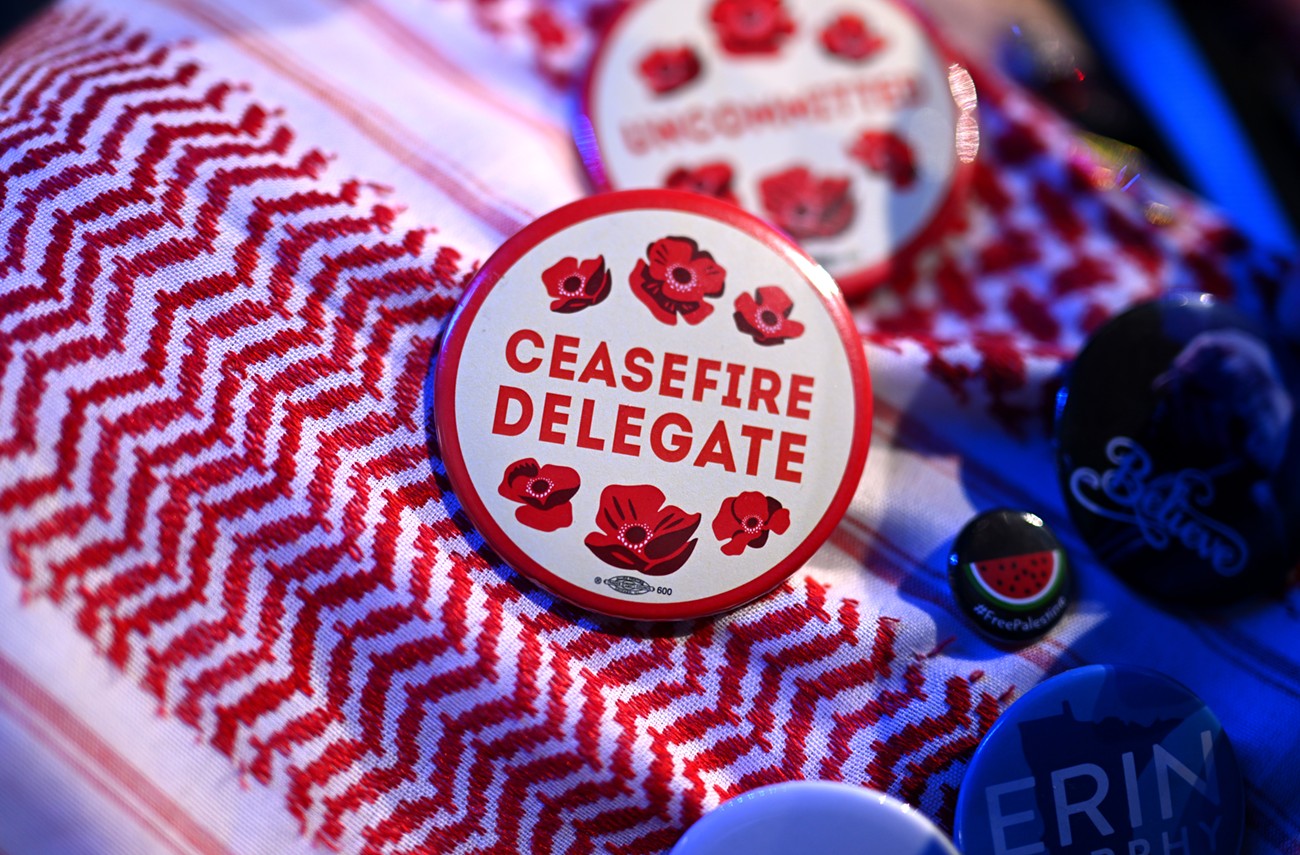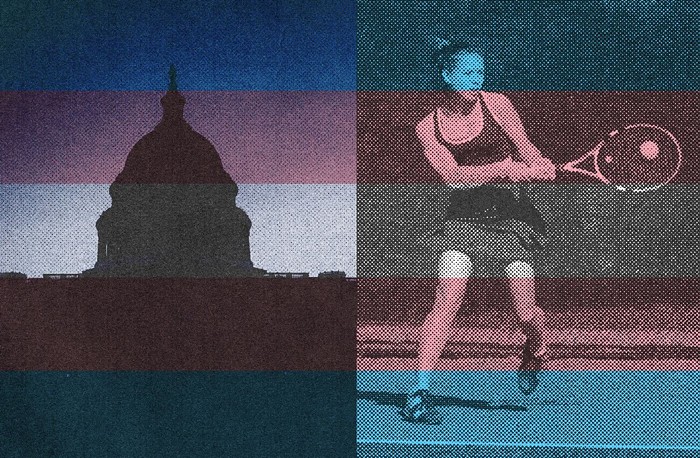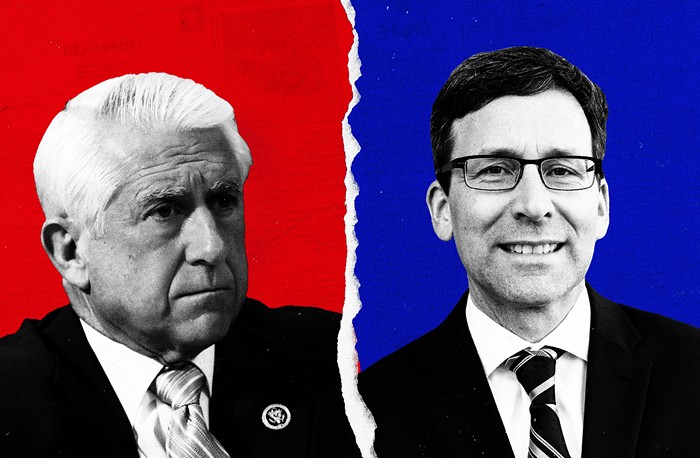Last night, one image from the Democratic National Convention dominated certain corners of social media: more than a dozen delegates outside on the sidewalk, some holding each other, some in tears.
The image was taken shortly after the DNC told the group of around 30 uncommitted delegates—who are part of a protest vote to demand an arms embargo on Israel and a ceasefire in Gaza—that the party would not allow a Palestinian-American speaker to address the convention today. Delegates said they weren’t told why the national party declined the request.
Very emotional scene here as Uncommitted delegates sit in tears on the sidewalk outside the United Center. pic.twitter.com/YUHsc0Ux17
— Alex Seitz-Wald (@aseitzwald) August 22, 2024
Among their suggested speakers was Dr. Tanya Haj-Hassan, a pediatric intensive care doctor who has been working in Gaza. She spoke at a press conference in Chicago earlier this week and described her experiences holding children’s hands as they died, and treating children with no surviving relatives—a situation that’s become so common that an acronym was created in hospitals there: WCNSF, or “Wounded Child, No Surviving Family.”
Yesterday, Israeli-Americans Jon Polin and Rachel Goldberg, the parents of a 23-year-old Israeli-American hostage in Gaza, spoke to the convention. The crowd greeted them with emotional cheers, chanting, "Bring them home.” The couple called for a ceasefire and described the 109 hostages as not a political issue, but rather a humanitarian issue. They described the “agony on all sides” but did not draw attention to the humanitarian crisis for Palestinians in Gaza, where more than 40,000 Palestinians have been killed and half a million people face catastrophic food insecurity.
Since midnight last night, members of the Uncommitted Delegation have staged a sit-in outside Chicago’s United Center. One delegate said that there have consistently been between 10 and 20 people participating in the protest throughout the morning, hoping to maintain pressure on the DNC and show the party that there is strong Democratic support for a ceasefire, and holding out hope that the party could change their mind on the convention’s last day.
“There were 40, maybe 50 delegates [showing] solidarity, all wanting to understand why a Palestinian speaker wouldn’t be approved for five minutes on the DNC floor,” said Yaz Kader, an uncommitted delegate from Washington state. “It just takes five minutes for us to end the sit-in, be welcomed back in, and enjoy the last day of the DNC, rather than feel silent and censured.”
Kader spoke to The Stranger about the delegation’s experiences at the DNC, and his hopes for the event’s final day.
[This interview has been edited and condensed for clarity.]
Many people outside of Chicago have seen the emotional image of the uncommitted delegates on the sidewalk outside the DNC. Can you tell us what was happening in that moment?
It was grounded in sadness. The uncommitted movement’s primary ask has been a weapons embargo. [But] in addition, we've had some smaller asks. One of those being: we would like a Palestinian speaker, or somebody who can provide a story of the Palestinian cause in Gaza.
[We] had recommended Dr. Tanya Haj-Hassan and some Palestinian elected officials that would have been acceptable for us and, I think, appropriate for the convention. And we have been asking for weeks now to have just a five-minute speaking slot, and have not heard anything concrete until yesterday.
This [especially] hurt because there had been an Israeli family speaking about their hostage situation on the convention floor yesterday. We obviously supported the Israeli family speaking—I think that we were all in solidarity with them, speaking and sharing their story of suffering. All we've asked for is some equality in the situation.
Some of what you saw [last night] was some hope lost in that moment, but even now, I will say: I feel optimistic. I know that it's hours away, but we are ready. We are literally ready with our speakers. We just need the call and we'll be ready to go.
Many of the issues put forth by the uncommitted movement are demonstrably popular in the Democratic Party as a whole. An overwhelming majority of Democrats support a ceasefire in Gaza, and almost half of likely Democratic voters support a decrease in military aid to Israel. But early signs show that it's not a high priority for voters in this election. Locally, we saw the issue struggle in our recent primary; and polling has shown that it’s not even in the top ten for voters nationwide. The convention is an opportunity to reach a huge number of voters at once. What do you hope the impact of Uncommitted will be at the DNC?
First, the amount of overwhelming support from the pledged Biden and Harris delegates has been just absolutely unbelievable. Among the 4,500 Democratic delegates, my interactions with almost all of them have just been overwhelmingly positive. I walk around with my kufiya in these halls, and people will come up to me, no prompt, and just say, “I support you. I'm with you. I'm happy that you're doing what you're doing.”
We recognize that our goal—an arms embargo or limiting weapons and a ceasefire—is something that couldn't be accomplished necessarily in four days. But we [came here with] 30 or so uncommitted delegates, and by the end of yesterday, we had almost 300 people signing on to our petition, asking for a ceasefire, asking for an arms embargo, saying [that they should] have the national uncommitted leadership meet with senior campaign staff.
What we have here is an issue where elected officials—in this case, President Biden and Vice President Harris—aren't clearly stating why they are going against what the Democratic base wants. What we still want [today], is to answer: what is Vice President Harris's foreign policy going to be? Is she going to be like President Biden, who has overseen the death of 16,000 Palestinian children? Is that going to be her foreign policy as well? Is she going to approve 20 billion in arms sales, as Biden did two weeks ago?
She hasn't answered these questions for the over 700,000 uncommitted voters.
What do you hope the impact of a Palestinian-American speaker would be at the DNC?
I spent some time thinking about how we got here yesterday. We have sunk months, hours—probably thousands of brain hours among all of us—with the hope that we would get something here, and one of those things is a five-minute speaking slot.
So why does a five-minute speaking slot matter? Every four years we have a Democratic National Convention. Let's say after every single one of those conventions over the last 50 years, there's five minutes dedicated to a Palestinian speaking about the struggle for Palestinians. Would we then still have 16,000 children dead? I don't think so.
It is the absolute bare minimum for the Democratic Party to say, we want a Palestinian voice in this party. There is enough room in this tent, and you are equal. You are equal, just as everybody else. Without it, I can only say that there's a level of inequality that exists within the party.
How do you think that speaker could impact voters this year?
It’s a starting point. It's not the end goal.
The uncommitted voters were not only, you know, it was a multi-ethnic, multi-faith, multi-racial, grassroots movement, and so it's important to recognize that. But it’s also important to recognize that some of the swing states that Vice President Harris needs to win, like Michigan and Minnesota—these states have relatively high Arab and Muslim populations. Michigan in particular has over 100,000 uncommitted voters.
A five-minute speaking slot is a starting point, but I'm not sure it's enough for the voters who are still uncommitted.
What about voters who are committed—who are Harris voters and believe in a ceasefire, but don’t necessarily consider it their highest priority with their vote. Do you think it could change how they're approaching this election?
I think from what I have gathered with my time with other delegates, they have a lot of support for us. We are not considering this a one or two situation. This is a one and two situation. You can be a Harris delegate and a ceasefire delegate. You can tell me right now that you'll vote for Kamala, and you can also tell me that you want an immediate, permanent ceasefire. It's important to recognize that.
Given the fact that President Biden has for the last 10 months been supplying the Israeli military so that they have killed over 40,000 Palestinians, it would be nice to know that we can turn the page, put a Palestinian [onstage] and have them speak about some of our sufferings–not as a contest, but just out of the humanity.



















